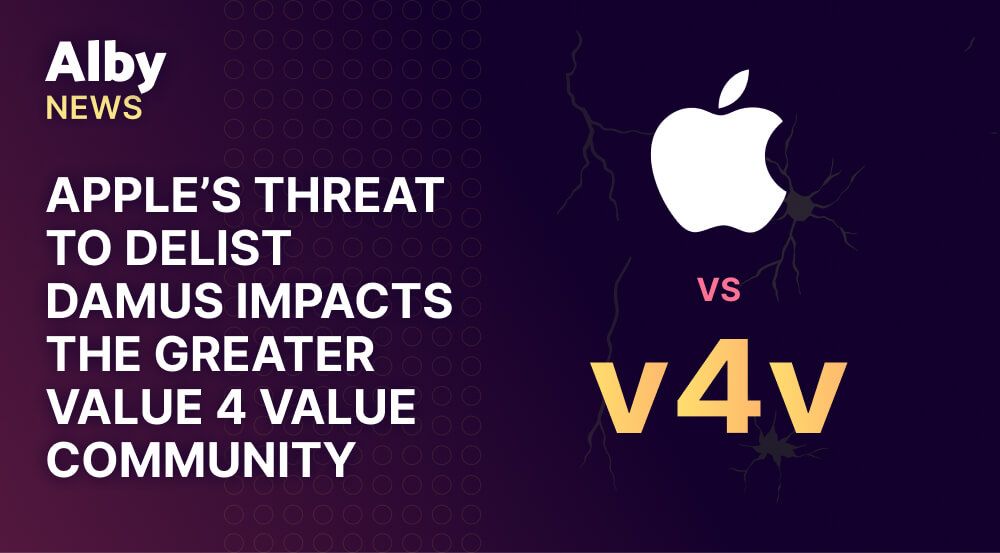Apple’s threat to delist Damus impacts the greater Value for Value community

- Apple does not accept Damus’ peer-to-peer payments feature as it does not use Apple’s in-app purchase system.
- This has implications for the broader Value for Value community.
- But Apple's guidelines officially allow exceptions that can be applied for Value for Value payments in apps.
Apple warns Damus
In a message to the developer team of Damus, an app building on the Nostr protocol, Apple announced to remove the app from the iOS App Store due to missing compliance with guideline 3.1.1. This guideline states that users must use in-app purchases to unlock paid features or functionality within your app, (by way of example: subscriptions, in-game currencies, game levels, access to premium content, or unlocking a full version). In-app purchases is a service by Apple for developers to accept payments directly in the app and a means for Apple to earn 30% on each payment. However, there are several exceptions to it, as listed in the official guidelines.
In the case of Damus, Apple claims that users can “send tips associated with receiving content from digital content creators with a mechanism other than in-app purchase. Although tips or donations may be optional, if they are connected to or associated with receiving digital content, they must use in-app purchase in accordance with guideline 3.1.1.”
After an initial reaction of the Nostr community, Apple is open for a conversation and scheduled a meeting with the team behind Damus.
What are Zaps in Damus
The form of payments implemented in Damus is called zaps in the Nostr community. Zaps allow users to make bitcoin payments on the lightning network to one another on any Nostr client that implements them. Zaps have become incredibly popular. All major clients offer their users to send zaps to each other for a variety of use cases.
For example, instead of just liking, reposting, and sharing notes (notes are the same as tweets on Twitter), users can send bitcoin to one another.
Impact on the greater Value for Value community
There are a variety of use cases of zaps today. Sharing appreciation in the form of a real value contribution is one of them. Commonly known as Value for Value, this form of compensation is adopted in many other areas such as podcasting, video creation, writing, or software development. Hence Apple’s reaction might impact a much bigger community of participants sharing value in the form of payments.
Those who might be affected the most are people how deliberately chose V4V as their main income source as we see increasingly in podcasting or for whom V4V might be the only way of participating in the global economy - unbanked creators from developing countries, people who cannot use Paypal or Twitch for monetization or creators with a smaller audience, that does not yet attract sponsorships.
Alby builds for the Value for Value community
Over the last year we have been working with numerous businesses and developers to bring bitcoin to their apps and enable instant peer-to-peer payments between consumers and creators. Value for Value (V4V) payments is one of the first use cases of micropayments with a broad adoption among publishers and consumers.
The passion the Alby team feels for the Value for Value model is based on the strong conviction about the rights of creators to be fairly compensated for what they create, and for fans to have more impact in supporting the creator they love. At Alby, we build on bitcoin to enable instant V4V payments of any amount across borders. Creators now have the chance to build up an independent revenue stream in addition to common advertising or affiliate-based compensation regardless of the size of their audience.
Ways to react on Apples accusations
It is too early to speculate about the outcome in the case of Damus, but there are ways to take action now. At Alby, we created a report about integrating bitcoin payments in apps distributed on Google Play Store and Apple App Store. According to Apples guideline 3.2.1: "Apps may enable individual users to give a monetary gift to another individual without using in-app purchase, provided that (a) the gift is a completely optional choice by the giver, and (b) 100% of the funds go to the receiver of the gift. However, a gift that is connected to or associated at any point in time with receiving digital content or services must use in-app purchase." In the case of Damus and other 4V4 apps the receiving of the digital content isn't related to the gift and thus should be allowed.
Along the way, we will update the document with the latest findings and recommendations for app developers. Updates may involve refining the terms of service or making adjustments to the UX copy. Sharing knowledge of how other apps deal with similar threads is crucial for all of us.
Steps ahead
Overall it is important to raise awareness for this issue about banning apps from important distribution channels such as official app stores and work on a solution together with these providers. By speaking with a unified voice, we can effectively convey our message and intensify the pressure on these closed platforms to loosen their restrictions. For instance, Google will let Android developers use their own billing systems, starting with Spotify. That’s why we are optimistic to achieve a positive outcome for both sides.
In our point of view, sending zaps, boosts or boostagrams is not selling digital content. It’s a form of feedback, a feedback backed by real value.
Please reach out to us if you have further questions, comments on the mentioned report or want to share learnings from similar cases. We will keep you posted, too.